The Feb. 27 closing event focuses on the ‘Campu’ podcast and an update on the CSU Japanese American Digitization Project.
By P.C. Staff
The Gardena Valley Japanese Cultural Institute’s Day of Remembrance activities culminated with a live Zoom webinar on Feb. 27 moderated by GVJCI board member and GVJCI DOR committee member Alvin Takamori.
Related story: Manzanar Committee Holds DOR Program
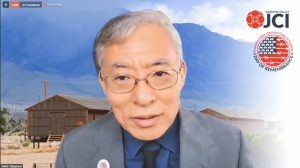
Takamori
In Takamori’s intro, he noted that in a “normal year, the GVJCI would have a bus headed up to the Manzanar Pilgrimage at the end of April, but this year, you won’t need the bus. The Manzanar Pilgrimage, just like this program, will be online.”
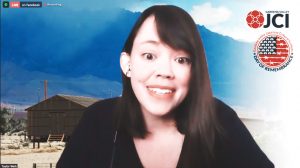
Weik
The live webinar was the final installment of the GVJCI’s DOR multiday program that featured an interview of “Campu” podcast producers (and siblings) Hana Maruyama and Noah Maruyama, conducted by Taylor Weik.
The second part of the GVJCI DOR program featured an interview by Eileen Yoshimura of Greg Williams and Jennifer Hill of California State University, Dominguez Hills, and its contribution to the larger CSU Japanese American Digitization Project.
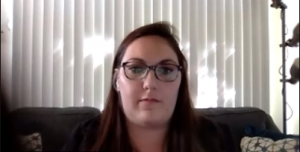
Hill
“Campu” is an eight-part podcast that, according to its description (densho.org/campu/), “ . . . tells the story of Japanese American incarceration like you’ve never heard it before” by using Densho’s archive of audio recordings of oral histories that weave together “narratives out of the seemingly mundane things that gave shape to the incarceration experience: rocks, fences, food, paper.”
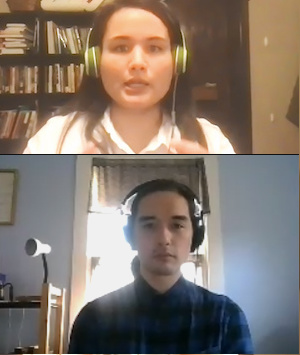
Hana Maruyama, above, and Noah Maruyama
The title “Campu” refers to the Japanese American “camp” experience, pronounced the way an Issei might pronounce the word. The siblings combined their differing strengths — history for Hana, who is a Ph.D. candidate in American Studies and audio engineering, and production and music composition for Noah — along with their shared heritage as descendants of people who experienced incarceration during World War II.
The Maruyamas discussed the genesis of “Campu” and how the pandemic-caused lockdown actually allowed them to focus on producing the podcast in association with Densho.
The second half of the Zoom webinar provided an update of CSUDH’s progress on JAD, with Williams, the director of the Archives and Special Collections Department at the university, and Hill, a project archivist.
“We’ll be showing you how easy it is to access these collections and documents, and we’ll also be telling you about what happens to documents once they’re donated to the university,” Yoshimura said.
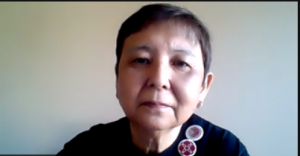
Yoshimura
“We ended up getting material from 18 different Cal State Universities and putting it into our website at Cal State Dominguez Hills,” Williams said. He added that the collection was supplemented by materials donated by 11 other institutions, such as the Eastern California Museum and the California Historical Society.
The California State University’s JAD can be accessed at https://csujad.com/.
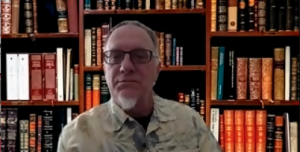
Williams
“The interesting thing that we found along the way was that people would also and still are donating material,” Williams added, noting that they are still accepting collections. “If the material is sitting in your garage, it’s not going to help anybody.”
A recording of the GVJCI’s program can be viewed at youtu.be/dB9oVnrYW0o.



